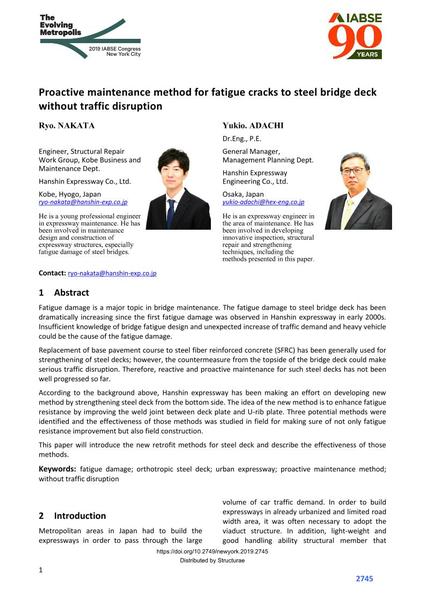Proactive maintenance method for fatigue cracks to steel bridge deck without traffic disruption

|
|
|||||||||||
Détails bibliographiques
| Auteur(s): |
Ryo Nakata
(Hanshin Expressway Co., Ltd.)
Yukio Adachi (Hanshin Expressway Co., Ltd.) |
||||
|---|---|---|---|---|---|
| Médium: | papier de conférence | ||||
| Langue(s): | anglais | ||||
| Conférence: | IABSE Congress: The Evolving Metropolis, New York, NY, USA, 4-6 September 2019 | ||||
| Publié dans: | The Evolving Metropolis | ||||
|
|||||
| Page(s): | 2745-2752 | ||||
| Nombre total de pages (du PDF): | 8 | ||||
| DOI: | 10.2749/newyork.2019.2745 | ||||
| Abstrait: |
Fatigue damage is a major topic in bridge maintenance. The fatigue damage to steel bridge deck has been dramatically increasing since the first fatigue damage was observed in Hanshin expressway in early 2000s. Insufficient knowledge of bridge fatigue design and unexpected increase of traffic demand and heavy vehicle could be the cause of the fatigue damage. Replacement of base pavement course to steel fiber reinforced concrete (SFRC) has been generally used for strengthening of steel decks; however, the countermeasure from the topside of the bridge deck could make serious traffic disruption. Therefore, reactive and proactive maintenance for such steel decks has not been well progressed so far. According to the background above, Hanshin expressway has been making an effort on developing new method by strengthening steel deck from the bottom side. The idea of the new method is to enhance fatigue resistance by improving the weld joint between deck plate and U-rib plate. Three potential methods were identified and the effectiveness of those methods was studied in field for making sure of not only fatigue resistance improvement but also field construction. This paper will introduce the new retrofit methods for steel deck and describe the effectiveness of those methods. |
||||
